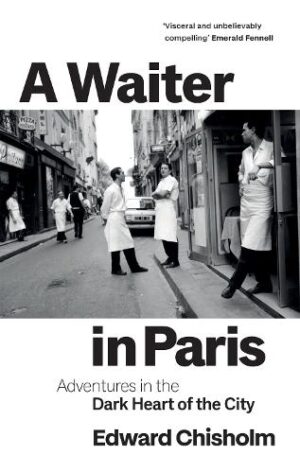The spirit of George Orwell hovers over the memoir A Waiter in Paris by Edward Chisholm. Indeed when Chisholm first arrives in the city in 2012, a copy of Down and Out in Paris and London is nestled in his suitcase, set to provide succour for his subsequent years of living unexpectedly on the brink of destitution. His account of life as a poorly paid, highly stressed waiter, surviving almost literally on coffee, cigarettes, and filched bread rolls, deglosses the elegant façade of one of the world’s most iconic cities.
A sporadically employed would-be writer in London, Chisholm is lured to Paris by a ‘wonderful French girl’, where he anticipates life as a ‘Baudelairean artist-poet’. Alas, the literary daydreams expire along with the love affair, and he finds himself not so much le flâneur as the about-to-be-homeless jobseeker. Returning to London would represent failure. Perhaps in a city blessed with literally thousands of restaurants, he could find work as a waiter.
It is at the pseudonymous Le Bistrot de le Seine that he finally secures a job and takes us behind the scenes of a Parisian ‘culinary amphitheatre.’ His role is that of runner. For the uninitiated, this is the lowest rung of front-of-house staff, and involves an awful lot of polishing cutlery and whisking dishes between the kitchen and restaurant floor. Chisholm may not quite be a waiter but he has one foot in the door (a door that will lead to fourteen hour shifts and a perpetual atmosphere of collective nervous breakdown).
In an often eye-popping and revelatory read, Chisholm introduces us to the unseen dramas and brutal hierarchy of the waiting staff. As an Englishman, he is loudly considered to be an inferior race when it comes to food and wine. His cheap suit is also a target for ridicule, another waiter even mockingly holding his lighter up to it. Caffeine, nicotine (and whatever it is the head waiter’s secretly peddling) propel them through the day, also fuelling frequent screaming matches and fisticuffs.
All of them are dirt poor, shafted by the low-wage economy, and Chisholm joins their ranks, renting cheap accommodation above a hooker bar, his rented room complete with eccentric roommate, bloodstains and ferocious bedbugs. Summoning the literary spirit of Henry Miller is of no use at all when contemplating his roommate peeing into the sink.
He waits for his colleagues to thaw. He is after all, just another migrant worker in their multicultural crew, all of them believing that their situation is temporary, their real lives waiting just round the corner. Working ‘society’s social hours,’ they have no real social life of their own and tentative alliances are formed, although this is often forgotten in the intense competition for tips and promotion.
Once Chisholm figures out how to crack the system, he just knows they’ll make him a proper waiter.
A compelling and insightful read from a Francophile, who despite the precarious nature of his Parisian experience, still feels his heart skip an excited beat as he walks under the shadow of Notre-Dame.
A Waiter in Paris by Edward Chisholm is published by Monoray, 384 pages.





